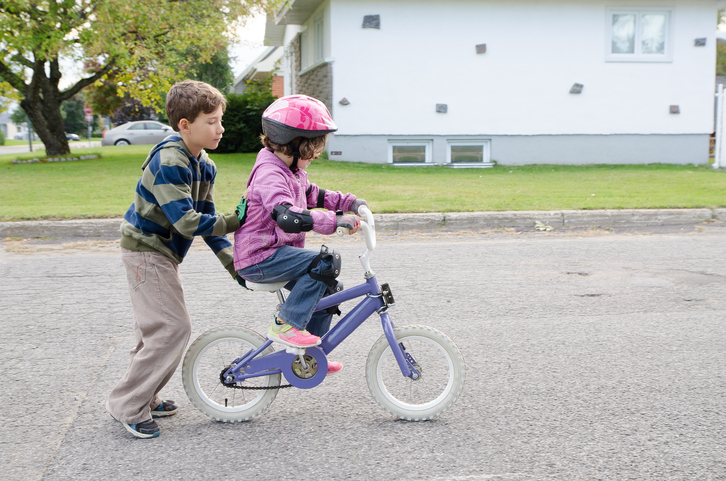 Codependency involves sacrificing one’s personal needs to try to meet the needs of others. Someone who is codependent has an extreme focus outside themselves. Their thoughts and actions revolve around other people, such as spouses or relatives.
Codependency involves sacrificing one’s personal needs to try to meet the needs of others. Someone who is codependent has an extreme focus outside themselves. Their thoughts and actions revolve around other people, such as spouses or relatives.
Codependency often appears in relationships which are unbalanced and unhealthy. A person with codependency often tries to save others from themselves. They may get hurt trying to “cure” a partner’s addictions or abusive behaviors.
Codependency does not qualify as a mental health diagnosis, mostly because the symptoms are so widely applicable. Yet it can still cause severe distress. Codependency may lead a person to develop other mental health concerns such as anxiety. A therapist can help a person reduce codependent behaviors and develop healthier relationships.
- What Does Codependency Look Like?
- What Causes Codependency?
- Addiction and Codependency
- Abuse and Codependency
- Parenting and Codependency
- Caregiving and Codependency
- Co-Occurring Mental Health Conditions
What Does Codependency Look Like?
In psychology, codependency describes one person’s behaviors and attitudes rather than the relationship as a whole. Someone who is codependent often builds their identity around helping others. They may “depend” on others to validate their self-worth. A codependent person may deny their own desires or emotions to get this approval.
Common symptoms of codependency include:
- Low Self-Esteem: Codependency may cause feelings of shame and worthlessness. A person may believe they do not deserve happiness. If a person does not value themselves, they may try to get others to value them. The sense of “being needed” can prompt internal gratification, even if the recipient of care does not show gratitude.
- Poor Boundaries: Codependent people often feel responsible for others’ happiness. They can have a hard time saying “no” or putting their own needs first. They may hide their true thoughts and feelings to avoid upsetting others.
- A Need to “Save” Others: Codependent people may feel it is their duty to protect their loved ones from all harm. If a loved one does something wrong, they will likely try to fix the situation on loved one’s behalf. Such behavior can prevent others from becoming independent or learning from their mistakes. It may also enable abuse or addiction to persist unchallenged.
- Self-Denial: A codependent person often prioritizes others’ well-being over their own. They may deny their own needs for rest, emotional support, and self-care. They may feel guilt or anxiety when asserting their own desires. Codependent people can feel uneasy when others offer support.
- Perfectionism: Codependent people often project an image of self-reliance and competence. It is common for people to take on more responsibilities than they can handle. When they make an error or receive criticism, they may grow insecure.
- Control Issues: A codependent person may link their own self-worth to others’ well-being. If a loved one fails, a codependent person may feel as if they failed themselves. Their attempts to make others’ lives better may shift into controlling or possessive behavior.
Not every codependent person will show all these symptoms. But if a person shows many of these traits, they may be codependent.
What Causes Codependency?
Codependency is usually rooted in childhood. Often, a child grows up in a home where their emotions are ignored or punished. This emotional neglect can give the child low self-esteem and shame. They may believe their needs are not worth attending to.
 Typically, one or more parents are not filling their role as guardians. Their dysfunction could be due to addiction, mental health diagnoses, or other concerns. The child may need to perform tasks that exceed their developmental ability. For example, if a parent is regularly too drunk to fix dinner, a young child may learn to cook so the family doesn’t go hungry.
Typically, one or more parents are not filling their role as guardians. Their dysfunction could be due to addiction, mental health diagnoses, or other concerns. The child may need to perform tasks that exceed their developmental ability. For example, if a parent is regularly too drunk to fix dinner, a young child may learn to cook so the family doesn’t go hungry.
Often the line between child and adult becomes blurred. If a parent isn’t filling their role, a child may become a pseudo-parent for their siblings. They might change a brother’s diapers or help a sister finish her homework.
Sometimes the child is expected to care for their own parent. A parent experiencing domestic violence may turn to the child as a confidante. A parent with narcissism may demand the child provide them praise and comfort. These interactions are often called enmeshment.
Since children are not fully grown, filling the role of “adult” can take all their effort. A child may be so focused on keeping the household running that they ignore their own needs. They may associate the caregiving role with feelings of stability and control.
As a child, codependent behaviors can be necessary for survival. In adulthood, the behaviors are not as adaptive. In fact, codependency can prevent a person from developing truly stable relationships.
Addiction and Codependency
Codependency may arise when someone is in a relationship with a person who has an addiction. The partner may abuse substances, or they may have an addiction to gambling or shopping.
The person with codependency may take on a “caretaker” role for their partner. The partner may rely on the caretaker to handle finances or household chores. If the addiction causes issues outside the relationship, the caretaker may cover for their partner. For example, someone who abuses alcohol may skip work. A codependent person may call the partner’s boss on their behalf and claim their partner is ill.
The caretaker often cares for their partner out of a sincere desire to help. Yet their behavior often enables their partner to continue the addiction. When the caretaker “saves” the partner from consequences, the partner often loses motivation to change. They may not seek the professional rehab they need. Without help, the addiction may get worse.
That said, the caretaker is not to blame for the other person’s addiction. While codependency can contribute to someone refusing treatment, it is not the only cause. Barring a safety crisis, someone cannot force others into rehabilitation.
This relationship can also harm the caretaker. The codependent person often throws their own needs to the side to care for the partner. Their codependent habits can worsen with time. They are unlikely to seek treatment for their own mental health concerns.
Abuse and Codependency
Codependency can also develop from living in an abusive household or relationship. Emotional abuse can make people feel small or unimportant. Codependent behaviors can develop as a way to counteract those feelings.
For example, someone may act as caretaker for a person with addiction in order to feel needed. Another individual may try to earn gratitude by catering to others’ needs at a cost to themselves. “Saving” others can make people feel empowered and important.
A person with codependency may feel responsible for the abusive individual. If an abuser has an untreated mental health concern, the person may try to “heal” them with care. Yet love alone is not enough to treat a mental health condition. The abusive person will need professional care to begin recovery.
Some people in codependent households may feel like they are protecting their family by keeping their problems private. But enabling one party’s abuse often causes harm to the other family members. Failing to report child abuse can make a person an “accessory after the fact,” and bring about legal consequences.
Parenting and Codependency
 Parents with codependency may try to live vicariously through their children. Some parents may try to protect a child from all hardship in life. Others may try to control a child so they grow up to meet the parent’s definition of success.
Parents with codependency may try to live vicariously through their children. Some parents may try to protect a child from all hardship in life. Others may try to control a child so they grow up to meet the parent’s definition of success.
This behavior can increase the risk of codependency in children. When children are allowed to explore the world and make their own plans, they develop a sense of independence. When parents make all the decisions, children may learn to ignore their own desires. They can also learn to place others’ approval above their own needs.
These effects can last for years. A codependent child may lack confidence and struggle to make decisions as an adult. They may seek out relationships in which someone else has all the power. Without help, the cycle of codependency may continue for another generation.
Caregiving and Codependency
Caregivers spend their days caring for a loved one who has a chronic illness or disability. They may provide transportation, help the person bathe, or offer other day-to-day assistance. Caregiving is often difficult in and of itself. Yet codependency can further complicate the dynamic.
If you are a caregiver, you may wonder about your own behavior. Where do you draw the line between typical caregiving and codependency? Every situation is different, but if you display the following signs, there may be cause for concern:
- Insisting a loved one do everything your way. When there is an issue of safety or health, you may need to put your foot down. But it is not necessary to make every decision for the person. If your loved one wishes to wear a certain shirt, you do not need to steer them toward a more fashionable wardrobe.
- Revolving your entire life around the loved one. Caregiving can take up a lot of time and energy. Yet it is important to rest on occasion and to have a social life outside of your loved one. Otherwise you may grow resentful and burnt out.
- Encouraging your loved one to rely on you alone. Many people like to feel needed. Yet if you see other caregivers as “rivals” or discourage your loved one from being self-sufficient, there may be an issue.
Codependency can cause a lot of strain between you and your loved one. Addressing codependent behaviors may improve your relationship. Setting boundaries and practicing communication can make a stressful situation a little healthier.
Co-Occurring Mental Health Conditions
Although codependency is not a diagnosis, it can interfere with a person’s well-being. People with codependency are more likely to have low self-esteem and strong feelings of shame. Research has found relationships between codependency and the following conditions:
Codependency is also a risk factor for substance addiction. Addiction can develop as a way to avoid difficult emotions. Some people may abuse substances to bond with a partner who is also addicted. A partner may also pressure the person with codependency into using drugs or alcohol.
If you think you may be codependent, you might wish to find a therapist. A mental health professional can determine if your behaviors resemble codependency. They can also treat any co-occurring mental health issues. In therapy, you can explore the roots of your behavior and learn to balance your needs with those of others.
References:
- Co-Dependency. (n.d.) Mental Health America. Retrieved from http://www.mentalhealthamerica.net/co-dependency
- Codependency and addiction: Symptoms and treatment. (2014, November 6). The Cabin. Retrieved from https://www.thecabinchiangmai.com/codependency-and-addiction-symptoms-and-treatment
- The common threat between food addiction and codependency. (2016, March 2). Alta Mira Recovery Programs. Retrieved from https://www.altamirarecovery.com/blog/common-thread-food-addiction-codependency
- Crawford, D. W., & Fischer, J. L. (1992, July 1). Codependency and Parenting Styles. Journal of Adolescent Research, 7(3), 352-363. Retrieved from https://doi.org/10.1177/074355489273005
- Denholm, D. (2012, February 29). 4 Signs a Caregiver Is Suffering from the Big C: Codependence. The Boomer Brief. Retrieved from http://www.boomerbrief.com/2012/02/4-signs-a-caregiver-is-suffering-from-the-big-c-codependence.html
- Emotional Abuse and Addiction/Codependency. (2016, September 6). Amethyst Recovery Center. Retrieved from https://www.amethystrecovery.org/emotional-abuse-addictioncodependency
- Knapek, E., Balazs, K., & Szabo, I. K. (2017). The substance abuser’s partner: Do codependent individuals have borderline and dependent personality disorder? Heroin Addiction and Related Clinical Problems, 19(5), 55-62. Retrieved from http://www.epaam.org/files/b/a/3/b/6/volumes-harcp-2017-v19-n5.pdf#page=57
- Springer, C. A., Britt, T. W., & Schlenker, B. R. (1998). Codependency: Clarifying the construct. Journal of Mental Health Counseling, 20(2), 141-158. Retrieved from http://search.proquest.com/docview/198715631?accountid=1229
- Wells, M., Glickauf-Hughes, C., & Jones, R. (1999). Codependency: A grass roots construct's relationship to shame-proneness, low self-esteem, and childhood parentification. The American Journal of Family Therapy, 27(1), 63-71. Retrieved from http://search.proquest.com/docview/230100367?accountid=1229

